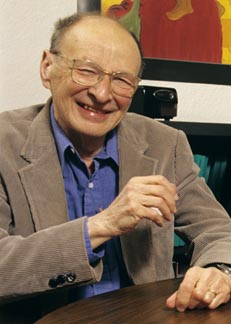Bronfenbrenner the Ecology of Human development

Sept. 26, 2005
Urie Bronfenbrenner, a co-founder of the national Head Start program and widely regarded as one of the world's leading scholars in developmental psychology, child-rearing and human ecology - the interdisciplinary domain he created - died at his home in Ithaca, N.Y., Sept. 25 due to complications from diabetes. He was 88.
University Photography
Urie Bronfenbrenner
At his death, Bronfenbrenner was the Jacob Gould Schurman Professor Emeritus of Human Development and of Psychology at Cornell University, where he spent most of his professional career. A memorial service organized by his family is planned for Saturday, Oct. 8, at 3 p.m. in Anabel Taylor Hall auditorium. A service for the Cornell community will be announced at a later time.
Bronfenbrenner's ideas and his ability to translate them into operational research models and effective social policies spurred the creation in 1965 of Head Start, the federal child development program for low-income children and their families. In 1979 Bronfenbrenner further developed his thinking into the groundbreaking theory on the ecology of human development. That theoretical model transformed the way many social and behavioral scientists approached the study of human beings and their environments. It led to new directions in basic research and to applications in the design of programs and policies affecting the well-being of children and families both in the United States and abroad.
His research also furthered the goals of Cornell's Life Course Institute, which was renamed the Bronfenbrenner Life Course Institute in 1993 and is currently directed by Daniel Lichter.
He spent many of his later years warning that the process that makes human beings human is breaking down as disruptive trends in American society produce ever more chaos in the lives of America's children. "The hectic pace of modern life poses a threat to our children second only to poverty and unemployment, " he said. "We are depriving millions of children - and thereby our country - of their birthright … virtues, such as honesty, responsibility, integrity and compassion."
|
Research for the Public Good: Applying Methods of Translational Research to Improve Human Health and Well-being (Bronfenbrenner Series on the Ecology of Human Development) Book (American Psychological Association (APA))
|